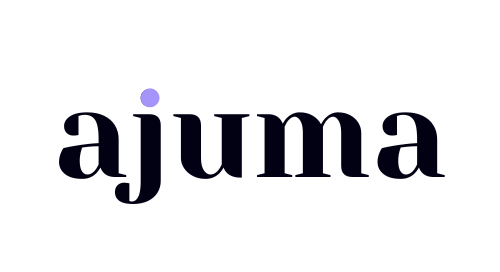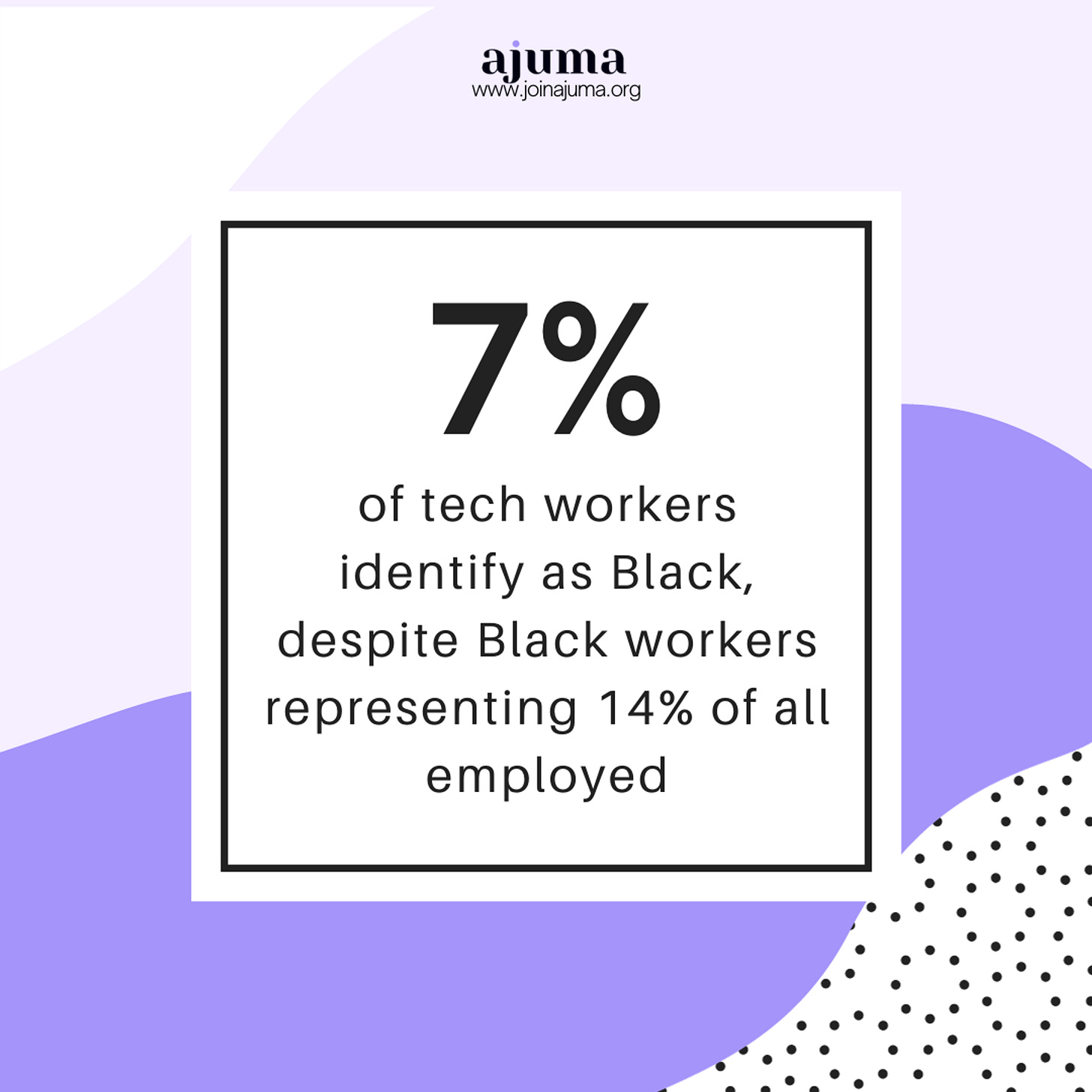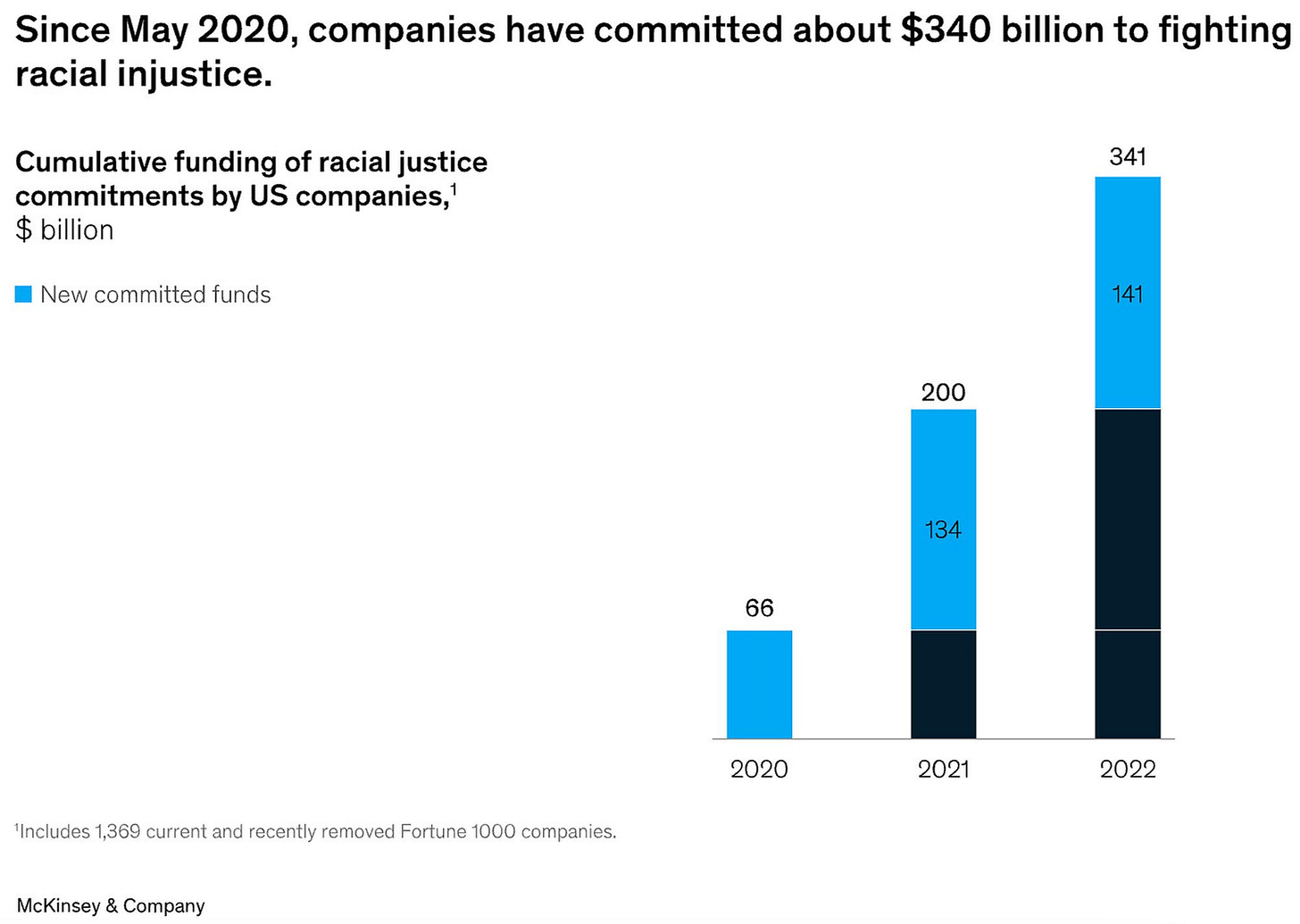Welcome!
Hello ajuma community! If you are receiving this, it’s because I believe you are aligned with ajuma’s mission and hope that you will join us on this journey. We send out a newsletter during the first week of every month that includes what we’ve been up to, how you can help, and shares our point of view on an equitable & inclusive future of work. This first edition is a 7 minute read and introduces the problem ajuma is trying to solve, explains ajuma’s vision, and outlines ways that you can get involved. To be removed from future newsletter sends, please unsubscribe.
TLDR: you can help by donating to our Giving Tuesday campaign, sharing this newsletter, or making introductions to Black & Latinx professionals, investors, and student club leaders. If you know anyone who values diversity & inclusion and empowering people of color, we’d love for them to join our community.
Black in tech
As a team of Black tech workers, we have seen the tech diversity gap firsthand. At my first tech startup, I was one of 2 total Black people at the company. Those numbers were similar at the companies I went to next. As a systems thinker, I began to reflect on the pipelines that brought people into tech and why they seemed to produce such homogenous worker populations. Certainly there were Black people interested in being in tech, but for whatever reason, they weren’t making it through.
I remember being able to count on my hands the number of Black coworkers I had and feeling a deep sense of imposter syndrome. If most people here don’t look like me, do I deserve to be here? If no one in leadership looks like me, will I ever advance here?
The problem is bigger than just representation. It’s bigger than just diversity - it’s about inclusion, equity, and belonging. It’s about radically transforming not only the makeup of the tech industry, but also the systems, processes, and cultures that govern it to be equitable and inclusive so that Black & Latinx tech workers can truly belong and thrive.
Introducing ajuma
ajuma (n): “your work or profession” in the Akan language of Twi, native to Ghana
Ajuma represents not only the work you do, but also who you are. The phrase “m’ajuma” means “my work.” We want to change the conversation about work from being something you have to do to being something you get to do as an extension of who you are. We believe ajuma to be exciting, fulfilling, and lucrative.
Founded in March 2023, ajuma is a nonprofit that prepares Black & Latinx undergraduates for business careers in technology. Our mission is to train the next generation of Black & Latinx tech business leaders. As we train these leaders, our vision is to build an equitable and inclusive tech ecosystem.
Tech has a diversity gap
Tech representation is even worse within leadership, the most important decision-making roles at any organization.
But this likely isn’t news after the racial reckoning we went through in the aftermath of George Floyd’s murder in 2020. Following the viral video of his killing, more than 1300 companies including Google, Intel, and Apple made pledges to allocate a collective $340 billion to address the legacies of racism in the United states.
Yet despite these large commitments, Washington Post wrote in 2021 that 37 of the 50 largest companies had disbursed only $1.7 billion of the nearly $50 billion pledged. In addition, the majority of these funds were allocated to external initiatives (housing, education, etc.) and not to internal initiatives to increase diversity & inclusion. Today, it is unclear how much of these commitments have actually been disbursed and what effect they did or didn’t have on racial injustice.
Why tech has a diversity gap
The tech diversity gap is in many ways not much different from the diversity gap in white collar professions as a whole. It is caused by a mix of systemic / institutional racism and discrimination.
Effects of institutional racism
Institutional or systemic racism deserves its own post and is explained at a high level here. We define institutional racism is the deliberate structuring of distribution systems to favor whites over people of color. Any system that distributes resources to disproportionally benefit whites is an institutionally racist system. Examples include redlining policies to distribute housing, loan distribution policies that favor whites, and healthcare systems that prioritize whites over people of color. These unequal distribution systems have resulted in an American Black & Latinx population that is underprepared to navigate the career transition into tech.
Many Black & Latinx Americans lack access to high quality education, which is often a pre-requisite for roles within the industry. Beyond that, because of the homogeneity of people’s networks, Black & Latinx Americans do not tend to be connected to people who work in tech. Since up to 80% of jobs are filled within the networks of the hiring committee, and tech hiring committees tend to be overwhelmingly white, Black & Latinx Americans are structurally excluded from access to the majority of these roles.
Assuming Black & Latinx applicants are able to get high quality education and be considered for the role by being in the right network, many of these applicants lack the relevant knowledge and training to succeed due to lack of access to insider information that would come from being around people who are in the space. All of these factors have resulted in few Black & Latinx tech role models for youth to look up to, which means many of them never bother to try because they don’t know it exists or don’t think it’s possible for them.
Discrimination
Unfortunately, today there are still leaders within tech organizations who do not believe that Black or Latinx workers should be working in tech, making it difficult for Black & Latinx workers to enter the industry.
Read more on discrimination in tech.
Why the tech diversity gap matters
The tech diversity gap matters not just because it is unfair to aspiring Black & Latinx tech workers, but also because it negatively affects the profitability of the tech sector as a whole. Although it’s not this simple, the more diverse a company is, the more likely they are to have a diversity of experiences in the room when making decisions like what products to offer on the market. Diverse opinions produce better decisions, as evidenced by the 19% revenue increase associated with diverse management. In addition, having Black or Latinx voices in the room can help prevent companies from producing products, services, or advertisements that are harmful to communities of color, saving billions in potential costs.
Making the economy work for everyone through Black & Latinx tech inclusion
Beyond corporate profits, the tech diversity gap represents trillions of dollars in missed wealth opportunities for Black & Latinx Americans and the world as a whole. Tech salaries are more than twice the national average and often come with equity packages that can be worth millions. Simply by choosing tech over other industries, over the course of a single Black or Latinx person’s lifetime, they will make at least an additional $3.4 million.
If we are able to increase Black & Latinx representation to the 14% private sector average, it would generate $1.3 trillion in wealth for the Black community and $1.1 trillion in wealth for the Latinx community.
This influx of wealth means breaking the curse of generational poverty for many Black & Latinx workers who make it into the industry. It means a significant increase in Black & Latinx capital to start businesses, make investments, and support those in need. This will have a multiplier effect on the broader economy, which will result in increased GDP and a wider array of products and services, benefitting us all.
What we’ve been up to
Since starting up in March of 2023, ajuma has been awarded $5500 in grants from the Yale entrepreneurial ecosystem through Tsai City Launchpad and the Henry F. McCance Entrepreneurial Award. In November, we formally established as a 501c3 tax-exempt organization. This fall, we ran a successful first program (aspire) and are launching a live interview series (the bridge).
aspire
Aspire is a 4-week virtual career prep program that introduces Black & Latinx undergrads to careers in product management and marketing. Our inaugural program launched in October of this year and featured 8 students from Yale, Brown, Spelman, and Franklin & Marshall. During the program, students engaged in panels with product managers, marketers, and recruiters from TikTok, IBM, Kickstarter, Google, and more. Each panel was followed by a working session to learn the skills required and the requisite next steps to succeed in the recruitment process. Our students enjoyed the experience, giving the program an NPS of 100%. Here’s what some of our students had to say:
“I've learned a lot about day-to-day expectations in roles I'd never heard of before. I have already began using the advice for reaching out to people in industries and companies I'm interested in.”
“The Aspire program has been a fantastic experience for me! I've found it incredibly insightful because it has introduced me to the world of the tech industry, even though I didn't have much prior knowledge before. I've particularly enjoyed the opportunity to learn about various roles in the industry, especially from the panel we had last week. It was interesting to see how others were able to transition into the industry and it kind of gave me an idea of possible paths I can follow.”
We are consolidating our learnings from the program, including helpful feedback about more asynchronous content, and launching aspire 2.0 in March of 2024.
The Bridge
On December 12th 2023, we are launching The Bridge series to facilitate honest conversations between Black & Latinx senior leaders in tech, students, and early career tech professionals. The Bridge is a monthly live interview between Yaw and a Black or Latinx tech leader to foster dialogue around Black & Latinx tech experiences. During the second half of The Bridge sessions, students are able to ask questions of the Bridge speakers and build relationships with potential mentors in the space. Our first Bridge guest is Issac Vaughn.
The ajuma vision
Programs
We plan to offer a suite of hands-on live programs to help Black & Latinx tech workers at key moments of their career progression, from their first entry point into the industry to their first promotion to senior leadership.
Conference
We plan to host an annual conference, bringing together Black & Latinx students and tech workers across all levels to network, learn about the latest tech trends, and conduct workshops & interviews.
Platform
We are launching the ajuma platform in 2024 to provide 1000 Black & Latinx students with access to free introductory tech courses and a community forum to support each other and interact with tech workers. Our vision for the platform is to be a central hub for students as they navigate their tech job hunt, featuring free courses, an abundance of resources, employer profiles with exclusive job postings, and a directory of accessible tech workers.
Tech inclusion ecosystem
We plan to provide strategic support to tech companies to help them implement more inclusive systems and processes. Through these partnerships, we can help build a tech ecosystem that is truly inclusive and equitable.
How you can help
Donate to our campaign to build the ajuma platform in 2024
Share this newsletter
Follow us on socials (LinkedIn, Instagram) & re-share content
Make introductions to:
Tech workers who value diversity & inclusion
Investors (institutional, angel, venture, family offices, etc.) who value diversity & inclusion
Heads of People at tech companies
Black or Latinx professionals
Black or Latinx undergraduate student club leaders
Thank you so much!












